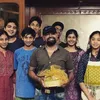Meet the man who set up Café Positive to change negative perceptions about HIV
Kallol Ghosh is working towards the welfare of HIV-positive children. His organisation provides them with education, shelter, and employment, and has started Café Positive, which is run by HIV-positive teenagers.
The stigma surrounding AIDS may have reduced in the last decade, but HIV-positive people continue to be perceived negatively.
Kallol Ghosh, 55, a resident of Kolkata, aims to change that with his initiatives, which include Café Positive. The place, known for its wafting aroma of coffee and typically buzzing with professionals, college students, and young adults, is run by a group of teenagers – all of whom were abandoned by their families on learning that they were HIV-positive.

Kallol Ghosh at Cafe Positive in Kolkata
Born in the city of Kanchrapara, Kallol has been giving back to society for more than three decades.
He began by volunteering with organisations such as the United Nations and UNICEF, and went on to establish Organisation for Friends Energies and Resources (OFFER), a non-governmental organisation that provides healthcare, education, and residential facilities to underprivileged children and youngsters affected with HIV/AIDS.
So far, he has been instrumental in providing institutional and residential care to over 10,000 children.
How it all started
After completing his education from Ramkrishna Sarada Mission and Calcutta University, Kallol Ghosh offered his services as a National Service Volunteer in 1988 with the Ministry of Human Resources Development. He subsequently worked on a few projects with the UN, and was deputed in Nepal during that time.
Kallol was keen on activities associated with child welfare, and engaged with UNICEF to run a student exchange programme where he roped in scholars from Oxford and Cambridge University to teach children from economically disadvantaged backgrounds.

Kallol Ghosh, 55, with one of the students being mentored by his NGO, OFFER
In 1986, he laid the foundation for OFFER and there has been no looking back.
Kallol gathered initial funds for the organisation from 10 to 15 of his friends, and decided to focus on youngsters after witnessing how they were ostracised on being detected HIV-positive.
“Out of the 25 lakh individuals who are HIV-positive in India, over 87,000 are below the age of 15 years. Many of them have to deal with a negative attitude, owing to the stigma surrounding the disease. This affects their physical wellbeing and mental state of mind, and I wanted to do something to improve their lives,” Kallol tells Social Story.

An individual places an order at the Cafe Positive counter
Through his organisation, he began offering support to those who tested positive. He conducted awareness campaigns and initiated multiple programmes to benefit children with HIV/AIDS.
“Our flagship project, Anandaghar, presently caters to 70 orphan children. As part of this, we manage a residential facility and provide essentials like food, clothing, and shelter. That is not all. We work closely with the West Bengal government to give them access to formal education, healthcare, and therapy, completely free of cost,” he says.
Located in Dakshin Gobindapur, a small village within the city limits, the facility is spread over an area measuring one acre and houses two three-storeyed buildings to accommodate the kids. The Armenian Holy Church of Nazareth in Badabazaar, Kolkata, sponsored Rs 3 crore for the construction of Anandaghar.
OFFER also runs similar residential programmes for other marginalised children, who are trafficked, intellectually challenged, and impoverished.
Creating waves of transformation
It is said that the first step towards eliminating vulnerability is to enable people to manage their livelihoods. This thought led Kallol to launch a café for HIV-positive teenagers associated with the Anandaghar programme.
One of the biggest challenges was finding a space to set up the coffee shop, which he named Café Positive.
“It took me six months to find a suitable plot of land. I ran from pillar to post, and faced many rejections. A lot of property owners turned me away after finding that I intended to employ HIV-positive individuals. Finally, I found a 12x10 feet garage at Jodhpur Park in Kolkata, and put in my personal savings to build it,” Kallol recalls.
Today, around 10 young adults manage the café on their own, from cooking and maintenance to administration. The cafe buzzes with college students and working professionals, especially over the weekends.

Kallol Ghosh with the some of young adults working at Cafe Positive
The ongoing COVID-19 pandemic has hit some of the organisation’s operations, but Kallol is hopeful that they will be back on track very soon. He is also planning to start a similar café in a larger space at Lake View Road in Kolkata.
“The objective behind starting a café like this was to create a sense of awareness in society about HIV, normalise conversations around the disease, and make the affected feel included, loved, and wanted. In order to build more such cafes, we have started a campaign to collect Rs 20 lakh on crowdfunding platform Milaap,” he says.
What does the future have to OFFER?
“This is just the beginning. I wish to continue empowering more and more such children so they can realise their potential just like anybody else,” Kallol says.
(Edited by Teja Lele Desai)








